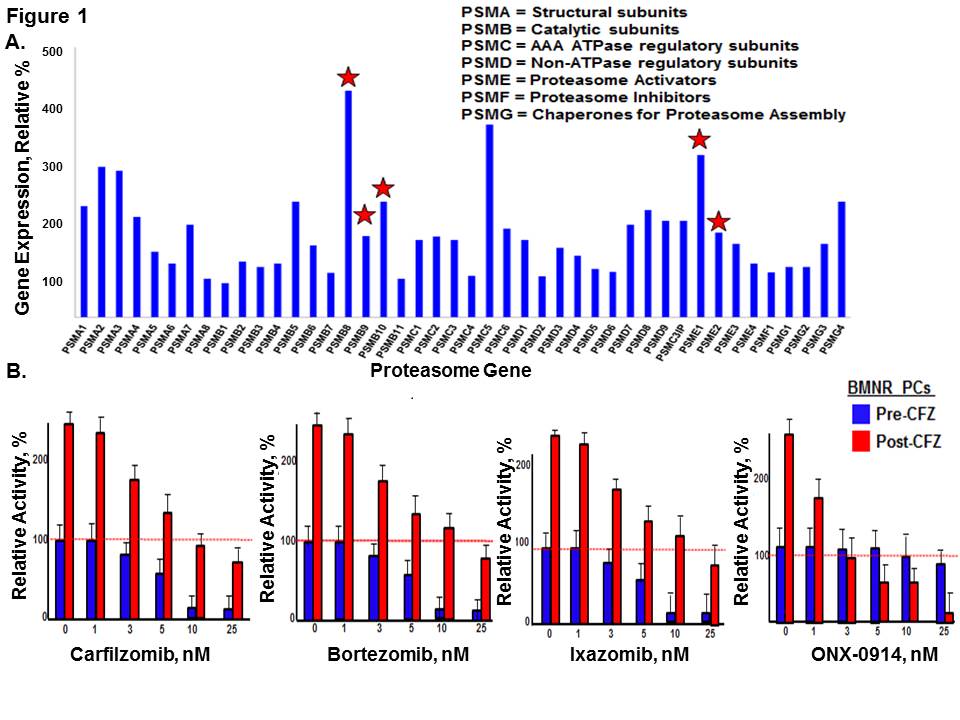Characterization of Human Plasma Cell Proteasome Adaptations to Proteasome Inhibitor Therapy: A Precision Medicine Approach to Overcome Drug Resistance in Desensitization.
1U of Cincinnati, Cincinnati, OH
2Cincinnati Children's, Cincinnati, OH
Meeting: 2017 American Transplant Congress
Abstract number: 109
Keywords: B cells, Genomics, HLA antibodies, Kidney transplantation
Session Information
Session Name: Concurrent Session: Clinical Science: Kidney Immunosuppression: Desensitization
Session Type: Concurrent Session
Date: Sunday, April 30, 2017
Session Time: 4:30pm-6:00pm
 Presentation Time: 5:42pm-5:54pm
Presentation Time: 5:42pm-5:54pm
Location: E354b
Purpose: Bone marrow niche-resident plasma cells (BMNRPCs) exhibit variable sensitivity to proteasome inhibitor (PI) therapy. Here, we characterized alterations in the gene and protein expression of human PC proteasome components that may mediate resistance to PI desensitization therapy.
Methods: HLA-sensitized transplant candidates received CFZ (20, 27, 36 mg/m2) with BM aspirates performed before and after CFZ. CD138+ BMNRPCs were isolated to >98% purity and total RNA analyzed on Ilumina TruSeq NGS platform (30 million reads/sample with paired end 75 bp sequencing). Strongly and differentially expressed gene sets were clustered and evaluated using enrichment and prior knowledge-based network and interactions analyses with ToppGene Suite.
Results: CFZ treatment significantly reduced BMNRPCs by ~70% as well as immunodominant antibody levels in HLA-sensitized patients. RNA-Seq analysis revealed that PSMB8, PSMB9, PSMB10, genes that encode the immunoproteasome (a structural variant of the constitutive proteasome with distinct catalytic activities and inhibitor sensitivities) were significantly upregulated in BMNRPCs that survived CFZ (Fig. 1A). In vitro evaluation of proteasome catalytic activities in BMRPCs revealed reduced chymotryptic-like inhibition by CFZ, bortezomib and ixazomib, but increased inhibition with an immunoproteasome-specific inhibitor, ONX-0914 (Fig. 1B). Western blotting indicated that immunoproteasome gene products were incorporated into high proteasome complexes and altered the substrate activities.
Conclusions: We demonstrate a shift toward immunoproteasome-specific proteolysis that mediates relative resistance to inhibitors of constitutive proteasomes in surviving BMNRPCs. Precision medicine may reveal novel strategies to overcome drug resistance, e.g., sequential therapy with a constitutive and immunoproteasome-selective inhibitor, that may enhance PC depletional therapy.
CITATION INFORMATION: Driscoll J, Tremblay S, Brailey P, Girnita A, Alloway R, Aronow B, Singh H, Woodle E. Characterization of Human Plasma Cell Proteasome Adaptations to Proteasome Inhibitor Therapy: A Precision Medicine Approach to Overcome Drug Resistance in Desensitization. Am J Transplant. 2017;17 (suppl 3).
To cite this abstract in AMA style:
Driscoll J, Tremblay S, Brailey P, Girnita A, Alloway R, Aronow B, Singh H, Woodle E. Characterization of Human Plasma Cell Proteasome Adaptations to Proteasome Inhibitor Therapy: A Precision Medicine Approach to Overcome Drug Resistance in Desensitization. [abstract]. Am J Transplant. 2017; 17 (suppl 3). https://atcmeetingabstracts.com/abstract/characterization-of-human-plasma-cell-proteasome-adaptations-to-proteasome-inhibitor-therapy-a-precision-medicine-approach-to-overcome-drug-resistance-in-desensitization/. Accessed February 19, 2026.« Back to 2017 American Transplant Congress
